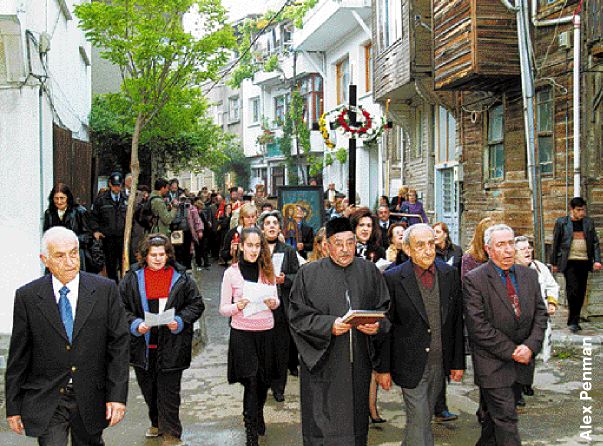 |
||
|
It's Easter in Istanbul |
||
|
The celebrations of a dwindling community spark Turkish curiosity and move Greeks to tears By Alex Penman Athens News |
||
|
GOOD Friday 2005. The ferry sailing to the Princes' Islands is more crowded than it would normally be at 4pm on a Friday. A crowd of Greek tourists has boarded. They are heading for the scenic islands, an hour from Istanbul, to venerate the Epitaph in one of the Orthodox churches. Another crowd, less numerous, less noisy and far less excited, are local Greeks heading the same way - they are the last descendants of a community that numbered 250,000 in the 1900s. Most of the visitors from Greece disembark at Halki (Heybeli), the third port of call, a name familiar because of the debate on the reopening of the famed Orthodox seminary there closed since the 1970s. Local Greeks know better. |
 Members of Istanbul's tiny Greek community take part in the Epitaph procession in the town of Prinkipo on the namesake island on Good Friday 2005 |
|
|
They disembark at the last of the four islands, Prinkipo (Buyukada). Exiting the impressive Art Nouveau terminal, one is greeted by a large poster hanging over the main street. It reads in Turkish: "Happy Easter to our Orthodox compatriots. Municipality of the Islands".
The crowds that jam the streets of the small town during summer are absent, giving the place a sleepy feel. In the small square where the horse-carriages assemble stands the church of the Virgin. The faithful of all ages proceed there. Psalms resound, policemen and the carriage drivers mill about chatting idly: there are no tourists for an island tour. The mayor of the Princes' Islands (simply 'the Islands' in Turkish) greets the faithful as they descend the stairs to the nave, situated below ground level. "I'm so moved," Katerina, a middle aged Greek-American, mumbles repeatedly to her husband. They are both Constantinopolitan Greeks, and she was born and raised on the island. "We haven't been back for more than 30 years. We left with bad memories," they explain. "It is so touching to be greeted by the mayor. To feel that our presence and celebrating is welcome," Stella, another islander living in Thessaloniki, explains. The church slowly fills. Apart from the nostalgia of Prinkipians spread to the four corners of the globe, who come to celebrate Easter in their island, what draws local Greeks and visitors is the Epitaph procession. Of Constantinople's 80-odd churches, only in this one the procession is enacted. "We come every year, ever since the procession was allowed on the streets," Elli explains. She, her husband, children and elderly parents come all the way from a Bosphorus suburb, at the other end of the city. "In our time, all the churches were full. Now, we have to plan carefully, in order not to end up alone with the priest," the parents complain. The procession exits to tour the town, according to Greek custom. The drivers line up in front of their carriages, looking on bewildered. First go local Greek children carrying processional candles, then the choir, comprised of Greek women from all over Istanbul, then the crucifix and the priests, followed by the crowd of approximately 60 faithful carrying candles. For an Istanbul Greek church, it is quite a congregation. Policemen precede and follow the cortege, talking on their walkie-talkies. Turkish shopkeepers come to the doors of their shops and people to their windows, staring in amazement. The Epitaph procession was not performed for decades. It strikes the island's inhabitants as exotic as a march of Buddhist monks chanting would strike the residents of Kolonaki. They have no memories of the Greeks. To them, it's all new. For the Greeks, it is touching. Many of the elderly are crying. As the procession returns to the church, a middle-aged man awaits by the door and wishes the faithful: "May God accept your prayers." Refik is not a member of the local council and no one asked him to do so. He is the owner of the shop nearby. "I'm so happy to see this celebration enacted again," he says. "I'm old enough to have seen the island as a little Greece. Many churches held processions at the time; they would all meet by the port. I also remember the Epiphany celebrations, the blessing of the waters in the port. Why all this ceased to happen I need not explain; I'm sure you know better." On Good Saturday, the Anastasis (Resurrection) draws many worshippers to the Bosphorus suburb of Yenikoy, once the tranquil Greek village of Nihori, praised in a poem by Kavafy for its idyllic surroundings. There are many Turks among the 40-odd congregation, accompanying Greek friends. Most Greeks are elderly. "I'm an avowed atheist, but I thoroughly enjoyed it. It was nice to join in this tradition," says Kenan, an art student accompanying his girlfriend, an Athenian who resides in Istanbul. As the group disperses, carrying lit candles and red eggs, a young couple timidly approaches. "Excuse us... You are going about with the candles... Are you celebrating something? Congratulations!" They are given a brief explanation. "We are an extinct species. We have become picturesque, an object of curiosity," an old woman says with deep melancholy in her eyes. |
||
| (Posting date 4 May 2006) HCS readers can view other excellent articles by this writer in the News & Issues and other sections of our extensive, permanent archives at the URL http://www.helleniccomserve.com./contents.html
All articles of Athens News appearing on HCS have been reprinted with permission. |
||
|
||
|
2000 © Hellenic Communication Service, L.L.C. All Rights Reserved. http://www.HellenicComServe.com |
||

